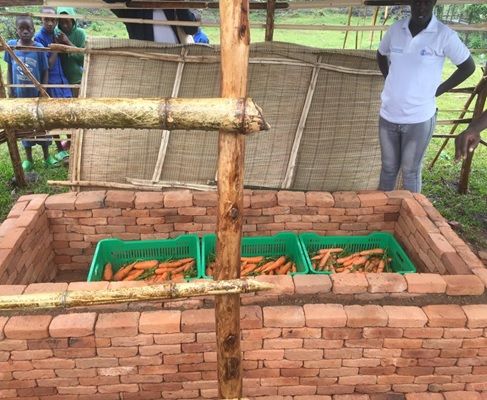Post-Harvest Handling Practices Change Fortunes for Carrot Farmers
Situated in the Western Province of Rwanda, Nyabihu district has a very conducive climate for vegetable growing. One of the key vegetable crops grown in Nyabihu is carrots, which are sold to urban areas across Rwanda. However, farmers continually incur losses due to the perishable nature of carrots—most of the carrots rot before reaching the market, becoming inedible and leading to significant losses for farmers.
Nyabihu farmer Mukasine Mariza faced this challenge many times. In previous seasons, she would harvest an average crop but then lose a large proportion to spoilage due to poor post-harvest handling practices. Adding to her woes, Mariza would be forced to sell off her produce at a “give-away price,” fearing additional losses since carrots are very perishable. Like most farmers, she would be at the mercy of aggregators who would take advantage of the perishability of carrots to pay less, forcing the farmers to accept poor returns on their labor and investment. The lack of proper post-harvest handling skills and equipment made vegetable farming an unprofitable venture for many farmers in Nyabihu district.
Mariza’s fortunes changed when USAID, through the Feed the Future Rwanda Hinga Weze activity, offered a $6,314 (6,243,597 RWF) investment to set up a cold room with a cool bot and construct a Zero Energy Cooling Chamber (ZECC) for her cooperative, KOGIMUIN. The cold room stores up to 300 crates, each carrying 15 kg of carrots, and, to date, the facility has handled 3,600 metric tons of carrots. The cooperative of 55 members also received 150 crates and one weight scale.
Using the facilities provided, Mukasine and others can weigh their produce, ensuring that it is stored upon harvest to keep fresh and is safely transported to the market without overexposure to heat. This support is in line with Hinga Weze’s goals as a USAID-funded Feed the Future activity to sustainably increase smallholder farmers’ income, improve the nutritional status of women and children, and increase the resilience of Rwanda’s agricultural and food systems to a changing climate.
From Hinga Weze’s training on good agricultural practices and post-harvest handling, Mukasine increased her yield from three tons per hectare to over 4.5 tons per hectare. Most remarkably, she also managed to increase earnings per yield from $379 (375,000 RWF) to $569 (562,500 RWF). Her earnings also improved after Hinga Weze linked the farmers to a cooperative of aggregators where their selling power is stronger, and they can negotiate better prices.
“I almost gave up farming, but now I no longer make losses. I save enough money for my children,” she said. To Mukasine and her cooperative members, carrot farming is no longer a burden as they continue to utilize their skills and facilities to reduce losses and earn more from farming.





